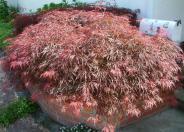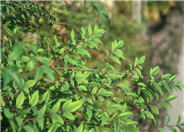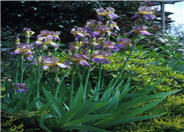
Common name:Red Japanese Maple
Botanical name:Acer palmatum 'Atropurpureum'
This Japanese Maple grows as a small, deciduous tree complete with palmate leaves that turn red and endure for the entire season.

Common name:New Zealand Flax, Wings of Gold
Botanical name:Phormium 'Wings of Gold'
The Phormium is a dwarf, growing to only 2'-3' tall. The stiff, vertical leaves are olive green in color with a yellow margin. It should be grown under full to part sun.

Common name:Nandina, Heavenly Bamboo
Botanical name:Nandina domestica
Nandina domestica is a graceful upright shrub that grows from 3'-6' in height. It gets its name from its bamboo-like growth habit. When thinned from the center it bears a remarkable resemblance to bamboo. It is best used in groups. It can be used in a shaded patio or out in a shrub border with full sun. An interesting feature of Heavenly Bamboo is the bronze color in the new growth when planted in full sun. It also bears clusters of white flowers in the spring.

Common name:Bearded Iris
Botanical name:Iris Bearded Hybrids
This perennial will grow 1'-3' tall and has medium sized, blue green leaves with flowers of different colors that bloom in spring. It needs well draining soil and full sun. Many are fragrant and rebloom several times a year. Plant rhizomes in Sept or Oct. They need water once a week during the hot spells. Top dress with compost and gypsum in January and August.

Common name:Lamb's Ear
Botanical name:Stachys byzantina
This tiny shrub will grow less than 1' tall and has medium-size, greyish-green leaves with blue and lavender flowers that bloom in the spring. This shrub is grown more for its velvety leaves than the flowers. It is drought tolerant once it's established. Be careful not to overwater.

Common name:Bugle Flower, Carpet Bugle
Botanical name:Ajuga reptans
This colorful groundcover will grow in shade or sun with slightly moist soil. It is an evergreen with purplish rosettes that spread quickly on purplish stems. Blue bloom spikes cover these plants in April and May, and are 6"-8" when blooming. This versatile groundcover can also be used in shady wildflower beds. -Holland Wildflower Farm
Designer: Jeff Gamboni Landscape Archite
Photographer: GardenSoft
Practice grass-cycling by leaving short grass clippings on lawns after mowing, so that nutrients and organic matter are returned to the soil.
Be sure to fix all leaks promptly no matter how small they may seem.
Attract, or buy beneficial insects such as ladybugs and lacewings to control pest outbreaks in your garden.